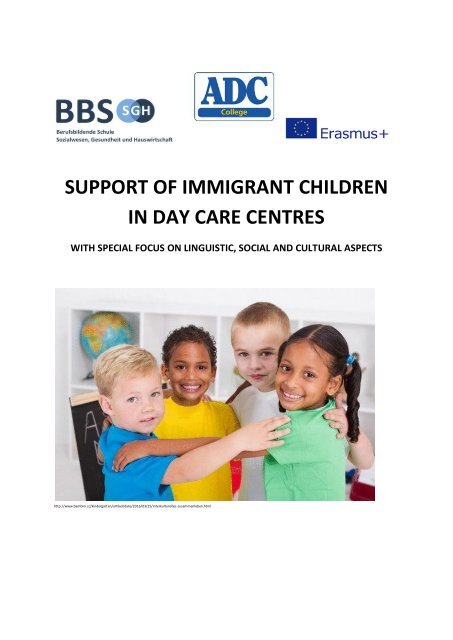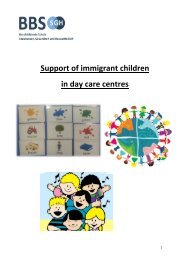Create successful ePaper yourself
Turn your PDF publications into a flip-book with our unique Google optimized e-Paper software.
SUPPORT OF IMMIGRANT CHILDREN<br />
IN DAY CARE CENTRES<br />
WITH SPECIAL FOCUS ON LINGUISTIC, SOCIAL AND CULTURAL ASPECTS<br />
http://www.bambini.cc/kindergarten/artikel/date/2016/03/25/interkulturelles-zusammenleben.html
Support of immigrant children in day care centres<br />
linguistic social cultural<br />
Entry 1<br />
Name Trainee: Julia Pickhan<br />
Work Placement Institution:<br />
Christchurch Kindergarten Ascension, The Ascension Church, The Avenue, Wembley, HA9<br />
9QL.<br />
1. Description of the situation<br />
In the nursery school you can find a lot of bilingual books, for example English-Albanian<br />
or English-Hindi. Furthermore, there are nursery nurses, who are able to speak Polish<br />
and Rumanian. This is a very important fact, because English is not the native language of<br />
most of the children. At last, the children sing English songs together in a morning circle.<br />
The topics of the songs are, for example, the ABC, counting numbers or stories of<br />
animals.<br />
2. Observed support<br />
The books and the songs especially promote the pronunciation and the speech<br />
comprehension of the children. With the aid of the multilingual specialised staff, they<br />
acquire a basic vocabulary of the English language. This is an important requirement for<br />
their further education.<br />
3. Hints for the practical implementation in German day care centres<br />
Mind the individual stage of development of each child.
Entry 2<br />
Name Trainee: Mann, Sarah – Kathrin<br />
Work Placement Institution: Melrose on the Hill<br />
1. Description of the situation<br />
The child and the nursery teacher are sitting on the floor of the board game area. The<br />
child has a jigsaw puzzle in front of him/her. The puzzle consists of two parts. One part<br />
shows a pictogram, the other one shows the respective word to it.<br />
2. Observed support<br />
The child’s task is to find the right word to the pictogram. For that to happen, he/she<br />
takes the part with the pictogram and speaks the corresponding word aloud. By<br />
pronouncing the word aloud the child tries to identify the initial letter. After that, the<br />
child searches the parts for that initial letter and when he/she has found the right word,<br />
he/she reads the word out loud before joining the two parts together.<br />
The teacher watches the child and corrects the pronunciation or helps with the individual<br />
letters if necessary. The child repeats each step until every part is linked with its<br />
counterpart.<br />
3. Hints for the practical implementation in German day care centres<br />
Can be implemented, provided that the day care center has a jigsaw puzzle in the same style.
Entry 3<br />
Name Trainee: Alex Tufan<br />
Work Placement Institution: Christchurch Kindergarten Ascension<br />
1. Description of the situation:<br />
In my institution there were many immigrant children, most of them Romanians. I noticed<br />
that these children could not speak or understand English.<br />
2. Observed support:<br />
A nursery nurse was Romanian herself and could translate everything to the children.<br />
Since I speak Romanian myself, I also had to work as a translator. I did not like to translate<br />
everything, because the children could not learn to speak the English language. Of course,<br />
the nursery nurses often spoke in English, as well as the other children. But,<br />
unfortunately, most of the time the language was translated.<br />
In addition, special posters were put up for the Romanian children. The posters were<br />
meant to translate Romanian words into English with the help of pictures and words. The<br />
poster included everyday words, like “milk”. In my opinion, the children were not<br />
integrated enough. The nursery teachers have tried to make it easier for the children, but<br />
they did not teach the Romanian children the English language enough. Also, I think the<br />
posters were not very useful. The children can hardly read at the age and cannot<br />
remember any of those written words. The nursery nurses should have spoken more<br />
English with the children and should serve less as translators. They have made the daily<br />
life easier for the children, but the children have not been supported and integrated<br />
sufficiently.<br />
3. Hints for the practical implementation in German day care centres<br />
Personally, I cannot recommend the methods of this English kindergarten. An application<br />
of these methods would not make sense in my opinion. To use the nursery nurses only as<br />
a translator is not a suitable support of the language skills. There should be more<br />
language exercises with the children in a funny way, such as learning with a picture<br />
memory or learning nursery rhymes and children songs in English. You could try to tell the<br />
children stories in English and then in Romanian.
Entry 4<br />
Name Trainee: Janina Schwaninger<br />
Work Placement Institution: Apple Tree Montessori Nursery<br />
1. Description of the situation<br />
Every morning we had ‘carpet time’, where the children were sitting on the large carpet<br />
next to the book shelves. At first, we sang a song and said ‘hello’ to every child. We talked<br />
with the children about the current topic „Dinosaurs“ and asked them some facts about<br />
dinosaurs. We also read some picture books.<br />
2. Observed support<br />
The use of songs and visual aid underlines the spoken word and supports the intelligibility<br />
for all children - even for those who speak the same language.<br />
3. Hints for the practical implementation in German day care centres<br />
In the nursery there are some children who do not speak English as a first language. In<br />
order to support these children, the nursery asks the parents for key words in their<br />
mother tongue to use in the nursery. They also provide bilingual books and display key<br />
words in the children’s native languages. Furthermore, the nursery uses visual aid to<br />
support the children’s understanding of the daily routine.
Support of immigrant children in day care centres<br />
linguistic social cultural<br />
Entry 1<br />
Name Trainee: Julia Pickhan<br />
Work Placement Institution:<br />
Christchurch Kindergarten Ascension, The Ascension Church, The Avenue, Wembley, HA9<br />
9QL.<br />
1. Description of the situation<br />
The nursery nurses made posters together with the children. The posters are about<br />
social values like sharing and listening to each other. The rules have been discussed with<br />
the children and hung on the wall. Besides, there are two children with autism integrated<br />
in the group.<br />
2. Observed support<br />
The children follow the discussed rules and attitudes and interact considerately with<br />
each other. If there is an argument between the children, the nursery nurses remind<br />
them of the posters. The children acquire human skills like give-and-take and empathy.<br />
3. Hints for the practical implementation in German day care centres<br />
Attach importance to the intelligibility of the rules. Include the children, make the<br />
handicrafts together. Self-efficacy and internalisation of the rules<br />
Be a role model.
Entry 2<br />
Name Trainee: Steffen Uwe Singian Bobis Malonzo Klein<br />
Work Placement Institution: Jolly Time Nursery School<br />
1. Description of the situation<br />
A boy asked me, if we could bake a cake out of sand together. He himself comes from<br />
India. I showed him how to make a cake out of sand and took a suitable shape. He always<br />
wanted to repeat it afterwards and was always convinced of his result.<br />
2. Observed support<br />
- imitation<br />
- self-relientingly baking a cake<br />
- with the help of a baking pan<br />
3. Hints for the practical implementation in German day care centres<br />
In this situation it is very important not to reject the child, instead to accept the child.<br />
Also, it is important to show the child that you want to help him. The role model function<br />
plays an important role. Also, be sure to encourage the child and say: "You’ve done that<br />
very well."
Entry 3<br />
Name Trainee: Steffen Uwe Singian Bobis Malonzo Klein<br />
Work Placement Institution: Jolly Time Nursery School<br />
1. Description of the situation<br />
An educator of the facility asked me, if I could take over the situation because she had to<br />
do something important. She was currently looking after a child who tried to write her<br />
name correctly, because she will soon be in first grade. I helped her and supported her to<br />
write her name in capital letters.<br />
2. Observed support<br />
- To be a role model<br />
- Motivate and encourage the child<br />
- If necessary lead his/her hand<br />
3. Hints for the practical implementation in German day care centres<br />
It should be noted that the child is motivated and encouraged. To praise it is very<br />
important, because it makes them feel accepted. They are not afraid to write their name<br />
anymore.
Entry 4<br />
Name Trainee: Julius und Lisa<br />
Work Placement Institution: Jolly Time Nursery School<br />
1. Description of the situation<br />
Three children are playing and screaming very loudly. One child complains that it’s too<br />
loud. Now the other two children adjust their volume, so that the first child is happy.<br />
2. Observed support<br />
3. Hints for the practical implementation in German day care centres
Entry 5<br />
Name Trainee: Julius und Lisa<br />
Work Placement Institution: Jolly Time Nursery School<br />
1. Description of the situation<br />
The children used empty crates to build a tower. First they put one horizontal followed<br />
by one vertical, so the tower became quite high very quickly. But soon it collapsed<br />
because of the wind. A girl (about the age of 5) suggested a different technique. She now<br />
leaded the group and all crates got stacked horizontal. It took more time for the tower to<br />
gain height, but it was steadier now. The leading girl spoke very good English and<br />
decided which child got which task, e.g. the taller children had to stack the boxes up<br />
above. She also criticised their mistakes. The nurse supported the group with questions<br />
like: “Is it steady now?”<br />
2. Observed support<br />
3. Hints for the practical implementation in German day care centres
Entry 6<br />
Name Trainee: Julius und Lisa<br />
Work Placement Institution: Jolly Time Nursery School<br />
1. Description of the situation<br />
A girl (about 3 years old) got pushed a little by another girl and cried. It looked as if she<br />
acted like this because she wanted attention. She looked in my direction, continued<br />
crying and walked towards me so I took care of her. A nurse said to her, that it wasn’t the<br />
intention of the other girl to push her and that she was a big girl and didn’t need to cry. It<br />
seems like the child is trying to test how she can get attention from new nurses and be<br />
confirmed in her role as the victim.<br />
2. Observed support<br />
3. Hints for the practical implementation in German day care centres
Entry 7<br />
Name Trainee: Julius und Lisa<br />
Work Placement Institution: Jolly Time Nursery School<br />
1. Description of the situation<br />
A girl gets hurt during free play and the other children involved in the game look for a<br />
nurse to help. As they realize that no one is nearby (apart from me), they decide to help<br />
her by themselves. One girl hugs the crying child and starts to sing a calming song. Soon<br />
another child joins in. A boy, who has Down-Syndrome, wants to play next to these three<br />
children. The other children know about his carelessness, tell him to stay away and softly<br />
push him away.<br />
2. Observed support<br />
3. Hints for the practical implementation in German day care centres
Support of immigrant children in day care centres<br />
linguistic social cultural<br />
Entry 1<br />
Name Trainee: Julia Pickhan<br />
Work Placement Institution:<br />
Christchurch Kindergarten Ascension, The Ascension Church, The Avenue, Wembley, HA9<br />
9QL.<br />
1. Description of the situation<br />
In the group you find a lot of different nationalities (e.g. English, Romanian, Polish, etc.).<br />
In addition, the mothers of a few children bring food of their culture to the nursery<br />
school, so that the children can taste it.<br />
2. Observed support<br />
The children get to know the cultures of the other children and learn to be open towards<br />
other cultures.<br />
3. Hints for the practical implementation in German day care centres<br />
Pay attention to allergies and dietary rules because of the religion.
Entry 2<br />
Name Trainee: Steffen Uwe Singian Bobis Malonzo Klein<br />
Work Placement Institution: Jolly Time Nursery School<br />
1. Description of the situation<br />
A boy in Jolly Time Nursery School has Down’s Syndrome, but the Down’s Syndrome is<br />
not so severe. He seems to get along well with a girl, because they are happy to see each<br />
other every morning. When she arrived at the facility one morning, I said to the boy: “Say<br />
‘good morning’ to her." He was happy to say ‚good morning‘.<br />
2. Observed support<br />
- example function of the adult person<br />
- promote decency<br />
- promote friendly facial expressions and gestures<br />
3. Hints for the practical implementation in German day care centres<br />
You should always show children that it is important to be polite to other children.<br />
Therefore, the educator should always repeat the ritual so that the children can learn<br />
what decency means and what it means to treat children respectfully.





